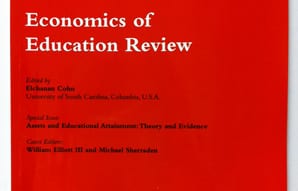A special issue of “Economics of Education Review” marks the first comprehensive set of studies that link assets and educational attainment. Research provides evidence that college savings should be included in policies for educational financing. 
The volume, published in April 2013, was guest edited by William Elliott, PhD, CSD faculty associate and assistant professor at the University of Kansas’ School of Social Welfare, and Michael Sherraden, PhD, the Benjamin E. Youngdahl Professor of Social Development at the Brown School and director of the Center for Social Development (CSD). Several papers are authored by researchers associated with CSD.
The articles, selected through a peer-review process, were presented at the Assets and Education Symposium held at the University of Kansas in March 2012. This was the first conference devoted to the topic of asset building and educational success.
“These scholars have found that student debt can be detrimental, but savings and assets are positively associated with educational success,” Sherraden says.
The studies in the special issue examine a wide range of variables and outcomes, but all point to the conclusion that assets may play a significant role in educational attainment. That role goes far beyond paying for college.
The authors find that savings accounts and other assets change expectations and behaviors of both parents and children, often resulting in increased school performance and achievement, as well as a “college-bound identity.”
One article examines data from CSD’s SEED for Oklahoma Kids college savings experiment and indicates that parents’ expectations for young children’s education vary based on the family’s financial assets, and positive expectations rise with increased assets.
Another, on the primary school level, examines data from the YouthSave experiment in Ghana and finds that students whose families have more assets and possessions achieve significantly higher scores in English. This YouthSave experiment is part of a multi-partner initiative studying youth savings in Colombia, Ghana, Kenya and Nepal.
Regarding college, articles document effects of savings on enrollment through graduation. Data collected six years after the completion of the American Dream Demonstration experiment show that Individual Development Accounts had a significant positive impact on college enrollment, especially among males. Other papers find a positive and significant relationship between assets and college graduation.
The United States has relied extensively on student loans for college financing, but student debt now totals more than $1 trillion, surpassing credit card debt. Moreover, high levels of student loan debt are associated with non-completion of post-secondary education.
This special issue demonstrates why asset-building – accumulating even a small amount of savings – may provide multiple benefits and result in greater achievement in schooling and beyond.
“If student loans help children pay for college only when they reach college age, but college savings has the potential for positive effects beyond paying for college, the better investment appears to be savings,” Sherraden says. “We may want to find innovative ways to enable children to accumulate assets to pay for college.”